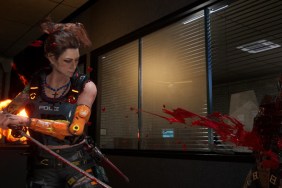This holiday is set to be one of the best ever for the PS3, despite the launch of the PS4, with a whole host of huge titles hitting the console every month. Among them is the new IP from SCE Japan Studios, Puppeteer, and we had a chance to talk to the creative director and writer of the game, Gavin Moore, about the title, the theater and humor in games, as well as getting the inside scoop on his next game.
PSLS: Hi Gavin, can you tell me a little about yourself?
Gavin Moore: I’m the creative director to Japan Studios and the kinda crazy brain behind Puppeteer.
And obviously you worked on The Getaway and more serious, violent games.
Yeah, that’s funny actually, I did The Getaway and when it finished I moved to work in Tokyo with Toyama-san, who did Gravity Rush, and we worked on three Siren games together. So after a very realistic violent gangster game, and a realistic scary horror game, I was fed up with making realistic things. And that’s why I wanted to do something completely crazy where I can do everything I like.
And now you can make a game your kids can play.
Yeah, the whole original idea was because my son and I were playing games, we were playing this team player game, and he just got up and walked outside to play with his friends. And half of me was like ‘that’s cool’, because I’m a dad, and the other half was ‘hold on a second, you’re a game creator and he should be playing games’.
So I sat down and asked him what was going on, and he said ‘well what we’ve been playing, it’s all the same, we’ve just been playing the same things’. So I asked him what he wanted – ‘I want a game that changes every 5-10 minutes’. And I was like [bulges eyes].
That’s a big ask…
Yeah, exactly, I was thinking about it for a long time and I had a story in my head for something I wanted to do anyway, but I really wanted to incorporate what he wanted in it as well. Kids are bombarded by information, so if he was feeling like that, I’m sure other kids and adults are feeling like that. And then I went to Bunraku, which is Japanese Puppet Theater, and what’s amazing about that is that you see the puppets, and they look incredible, and then the sets are changed realtime behind the action and suddenly they’re in a completely different environment, but the play still continues on. So if I make this magic theater, and then being an animator, originally it was like ‘I’m going to make the whole thing move all the time’ – so I can do something my son is going to enjoy, but then I can deal with my own wishes as a creator of what I want to do.
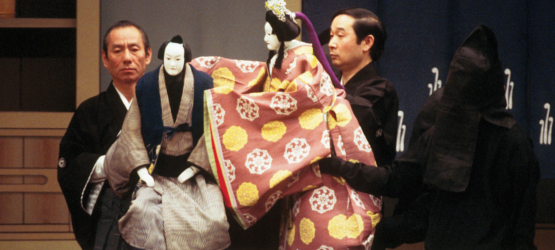
Were there points where you thought ‘I shouldn’t have done this, it’s too ambitious?’
[Laughs] I think there were points my staff hated me, because we don’t really use any technology: we wrote our own rendering engine, our cloth engine, etc… and we’d have 3D. But we don’t really use any physics engines at all or anything. All that animation has to be done by hand. What we say is that you basically shouldn’t be able to see anything in Puppeteer twice. So all my background artists would make all these backgrounds and then people would run past them in two seconds. That’s it. And people would get angry with me because they would ask if they can we use stuff again, but I’d say no.
So how many different areas are there then?
It’s a three act play written in seven acts… [laughs] and in each act there are what we call curtains and then there are 21 stages, if you will. But a stage could last you between 15 minutes and 45 minutes depending on what’s going on. There’s what we call routes inside a stage, so for instance ‘The Kitchen’ level is one route and ‘The Tower’ level is another. So normally you’d get between 4 and 5 routes in a curtain.
And you have a flying ghost cat with you – is that always there?
For the first act the cat is there, and after that you play the smaller fairy-type character Katerina and she’s got her own agendas with the Moon Bear King because he’s transformed her into that and she’s not really happy about it. But the cat and the witch turn up a lot in the story. But what’s interesting is, and this is a good hint to your readers, the cat is incredibly important…
You can control both the main player and the cat at the same time with the same controller.
Yeah, when people play a normal platforming game they run through them – right? They wouldn’t see anything, but with our game we’re trying to make it more like theater, so we dictate the pacing. We’re trying to slow them down to let the acting and the voice work come through. And the way you do that is give them this secondary character where they can hunt around and find objects and touch on things. In single player that’s all you can do with that other character, in two player that character has a lot more stuff. Yeah you can hunt around and touch on things – but you can also stop enemies attacking you, you can get rid of objects that are going to hurt the main character, you can pull the heads of little enemies, and things like that. You can collect gems, but if you don’t give them back to the main character then they don’t get them; for instance, the cat just gets fatter and fatter. You can also get in the way of the main player and cause problems. You can click on things and make them pop up and throw player one in the air. So you can help them or hinder. You can pull the lead character’s head off as well [laughs].
But two player is really cool because, you know what I said about my son, he got up and left me in the middle of a two player game – that’s the end of my game. But what we do is even if you select one player or two player at the beginning of the game it doesn’t matter, because if you don’t touch the second controller, it will always switch back to one player, and if you select one player and pick up the second controller, it will turn in to two player. So it means you could be playing and then you might need some help, so then you pull over your friend, and they can pick up a controller and help you, and then put it down again and carry on what they were doing. That happens to me a lot in my household – my kids are like, “Dad, I need help”, and I say “I can’t, I’m writing.” And even if I do help, these are single player games, so I have to take the controller away from them, clear it and give it back, and they feel like they haven’t achieved anything. But with this, that doesn’t have to happen.
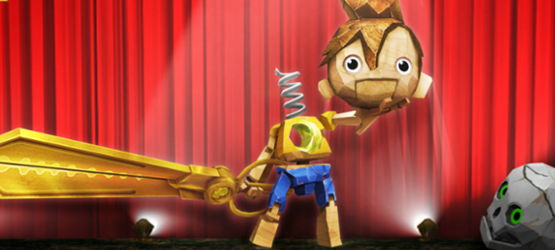
How long is the game?
If you ran through the game, it’s about ten hours. Normal play is between 12 and 13 hours. But because the heads are your life, and they fall off, and you find these different heads and they can do different things in the game, to actually find all the secrets in the game, like all 100 heads, you can’t do it all in one straight play-through. What’s kind of cool is that there are also four hero heads, and those are the heroes of the moon when the goddess was usurped by the Moon Bear King and they rose up in this rebellion against him, but they were pathetic and he killed them and ripped off their heads and threw them into the moon as a warning to everybody else. And you can find those heads, which you can never lose, unlike the normal heads. But the way the game works, is in the kitchen you’ll see a bomb mark on the pot, but you don’t get the ninja’s head which has the bomb power until act two. But yeah, there are a lot of secrets [grins].
There are heads coming off, souls being destroyed – it’s quite dark.
Well the way I wrote it was in English and Japanese at the same time with a Japanese writer helping me. It was really interesting because the mandate was Tim Burton, Monty Python, Terry Gilliam – that was it. And so we had a whole day of Monty Python where we just sat and watched it and Terry Gilliam movies. So it’s written for both kids and adults. There’s a lot of humor kids won’t get, sarcasm and stupid things where adults will go “That’s brilliant. That’s really funny.” And it’s dark because I think that human beings inherently like that sort of darkness. We’re leaning towards more of a black world rather than a nice white world, so we wrote it particularly a dark fairytale. Well, I call it a fairytale, but it’s more of a Greek three act play. Kids and adults will like it. You can see that from the popularity of Tim Burton.
Usually developers have to tell voice actors to rein it in a little, but I heard on this game that you told them to really let loose. Was that fun?
It was great. It took three weeks in January this year in London and it was just great. The narrator Stephen, he’s an old theater actor who does films and everything, and he was in Blake 7, which is fantastic. We’d done a bit of work before with him for some promo stuff, like gamescom, but he didn’t really understand the scope of it, and he got this great big massive wad of paper, the script, and he just got really into it. He said it’s some of the best writing that he’s had as a script. There’s a lot of alliteration in his lines – it’s very difficult for a voice actor to do continually and get the mood of it and he did it amazingly. All the other actors are brilliant too, the witch is wonderful, she actually does The Archers, and she was having such a laugh- everyone was having so much fun.
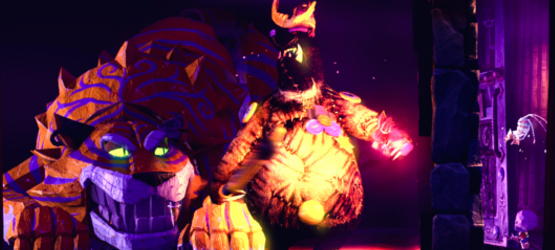
Humor is very difficult in games I find.
I think it’s very difficult and it’s very rare. It’s either very cheesy or there’s no humor and it’s very serious. But we were having so much fun with writing because we had the script and then we had the game on gray box. We were a very small team, like 15-20 people, working for a couple of years, and we went away and did all the image boards and then some guys came off another project and helped us out so we could finish the game in the final year. I think we were 65 of us max. So they would put all the stuff in and at the same time the game designers were adding new stuff because my motto was “that’s my game, but the developers can put in whatever they want.” And we would review it every two weeks, and if we liked something it would stay in. It meant that everyone was really into the product, because they felt it was their game. And then I’d see the new additions, and if they were right, I’d include them in the script, doing lines for characters that wouldn’t even have been there.
In the graveyard stage, at the end you smash down on this coffin and out comes this vampire and he goes “Raaah! I’m going to suck your blood.” And he stops, realizes you’re a puppet, and goes “You’re not a virgin bride. You’re not even human.” And he sits at the end of his coffin and goes off on this three minute long monologue: “come to the dark side of the moon they said, you’ll be safe here, kids aren’t afraid of me, games are so violent, they think I’m a joke.” And he just goes off on one. In the game you don’t have to listen to it, you can carry on and leave him there, but if you just sit there and listen to him, it’s my favorite piece of writing that we did.
We like to break the fourth wall a lot, we talk to the audience, characters forget lines – when you’re on the start screen for instance the narrator is saying things like “please turn off your mobile phone, no one wants to listen to your flashy ringtone, least of all me.” And then you can hear characters behind the curtains saying “who’s on first? I can’t remember, is it you or is it me. Where’s my script?” That sort of stuff.
Can you explain the process of writing a game to someone who has never done it?
What I always do is I come up with one single idea, and it’s always a story point for me, and it’s always funny when it happens because you think about it, think about it, think about it, and nothing comes – but then you’ve got a kind of idea, and you’re not really sure, then it turns into something else, and then suddenly it just hits you exactly what you want to do. And it’s always a few words for me. Like for my next game the few words are: buddy movie, road trip, Kansas, Romania. And then everything kind of comes together.
Is that the actual game then?
Yeah, that’s what I want to do next. From that, I don’t think anybody’s going to be able to understand what I’m going to turn out.
I’ve completely worked it out.
[Laughs] I hope not. But for Puppeteer it was: Moon Bear King and puppets. Writing the story I knew it had to be about this king and the protagonist Kutro, who never speaks – which is very important to me. He still gets across all of his emotions and goes on this journey from being a frightened little child basically, to something more. And that’s why it’s called Puppeteer, because everyone’s trying to pull his strings, but it’s about him in the end making his own decisions. But the story is about the Moon Bear King.
So that’s how I start, and then comes the writing. The way that goes is, I write two pieces – a synopsis, and then a list of game ideas, which the synopsis helps me to create. Like I wrote these magical scissors into the plot, and then I realized that magical scissors would be awesome in a game… and there aren’t any games characters that I know of with scissors. Everyone enjoys using scissors as a kid, and everyone knows the sound that they make – snip, snip, snip – and I wanted to get that into the game. So the scissors were the first gameplay aspect of the title, and the theater changing was the second – I knew it was going to be a play.
So I started to think if he’s a puppet, how do we do lives? And stuff like that. It’s boring, collecting hearts or whatever. So we got some Lego characters, and I was mucking about, and the head of one came off, and so that’s how we did lives. It was kind of funny. At the beginning we had it so that you could collect the hundred heads and keep all of them, and when you got hit by a small character only one head would fall out, but if you got hit by a big character 25 or 50 would fly out. But because there has to be collision around the screen to give you a chance to get them back they will bounce back into you and you’ll get them back without doing anything. So it looked great but it was too easy.
[Editor’s note: The final game gives you 3 heads, each of which represents a life. When hurt, the head bounces away and you have a few seconds to grab it before it fades away]
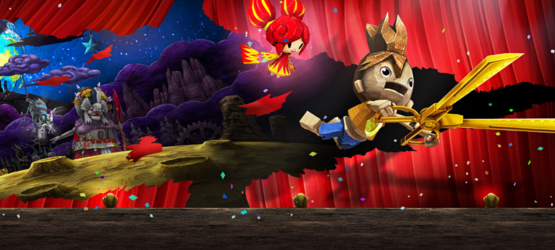
This is a game that’s a new IP, at the end of a generation, during a very competitive time. Is it important that Sony invests in something new?
Well I think it is. We’re having a kind of ‘Indian Summer’ for PlayStation 3. It’s amazing, we’ve just had The Last of Us, you’re going to get Puppeteer, you’re going to get Beyond, you’re going to get rain…
And Gran Turismo.
Yup!
Oh and Ratchet & Clank.
Yeah! And that’s just from SCE Worldwide Studios. It’s important for us that we don’t just drop the console and leave it for dead just because we’ve made another one. There are a lot of people that can’t afford a PlayStation 4 yet, or can’t even get their hands on one because Sony can only make so many. It’s important that we keep supporting those PlayStation fans, there’s something like 80 million PS3s – that’s a lot of fans out there that need games. Puppeteer is exactly the sort of game we should be making in my opinion. As a developer, Naughty Dog’s mandate is to make AAA blockbusting Hollywood crushing titles, and it’s the same for Santa Monica – whereas our mandate at Japan Studios is to make games that nobody else can see on another console. So it’s kind of crazy in our studio because it’s a bunch of insane people coming up with strange ideas. We’re kind of left alone to come up with what we want. We’re obviously tracked, we do have green light meetings and stuff like that, but because we have smaller teams and smaller budgets to work with there’s less risk, so they allow us to be more creative.
Launching new IPs is always hard, and you’re coming out in the same month as GTA, do you think you’ll be able to stand out.
I don’t know, I have no idea. [Laughs]. The thing about Puppeteer is that it looks like LittleBigPlanet, but it’s not. And it’s not a kids’ game. I may have made it to play with my son, and spent Sony’s money doing it, but I’m a gamer and I love games and I made it as a game I could play as well. So I would say to your readers, if you’re a gamer, this game is only €39.99, and I think it’s down to only £22 on Amazon – that’s not even a night down the pub. Cheaper than a theater ticket, 12+ hours long. And it’s not even a budget title, it’s only that price because it’s a new IP with a new director.
Is it an IP that you hope to take further?
Yeah, definitely. I know people are going to fall in love with Kutro and the characters and stuff, and they may come back, but the IP really isn’t Kutro – it’s the theater. You can do anything in the theater, which is interesting; you could do Romeo and Juliet, Macbeth, or you could do The Lion King or some off-Broadway crazy stuff. You could do anything in that setting, that’s what theater has been doing for hundreds of years.
On that note, you have Sony and Microsoft talking about how they have all these TV shows and movies based on games… If a theater producer was to come to you and ask to make a Puppeteer play, would you go for it?
It’s funny, because the music in the game is written by Patrick Doyle. Patrick was the theatrical director for The Royal Shakespeare Company – he also writes a lot of movie soundtracks, from Carlito’s Way to Harry Potter. And he wrote 70 tracks for Puppeteer, because variation is everything. And then he came to me and said Gavin, I want to do the musical version, and I said “Patrick, if you want to do the musical version, go ahead. You can produce it and direct it, I’m not getting involved.” [Laughs]
Puppeteer is out on September 10th in the US, 11th in Europe.


